RN Job Description
When working as an RN, you may still perform many of the same functions as you would an LPN.
However, you could have more authority over how to treat a patient and what forms of medication and procedures to offer to inpatient and outpatient recipients.
You might earn at least $10,000-$20,000 more per year as an entry-level RN.
You might even earn up to $30,000 or more after a few years and some more certifications.
Duties
- Evaluates individual or group nursing care
- Oversees performance of LPNs, RNs and Medical Assistants
- Plans and implements time-tested health restoration procedures
- Assesses patient’s treatment needs after diagnosis
- Administers medications
- Answer questions asked by patients, nursing assistants and practical nurses
- Delegate tasks to medical staff based on their experience
- Explains how to care for wounds, trains LPNs, CNAs and other assistants
- Monitors a patient’s condition
- Provides updates to physicians
- Documents medical test results and explains them to doctor and patient
- Educate patients on how to prevent health problems
- Supervises entry-level medical staff
Salary
Entry-level RNs can make $77,600 per year or more as of 2022, especially if they’ve already worked as an LPN for at least a few years.
The lowest salary totals approximately $59,450, which isn’t much more than for an entry-level LPN.
You’ll want to find out how expensive it is to live in the place where you want to work before you take on too low of an RN wage.
Otherwise, it might not be worth it to take all that time to train for an RN position.
Make sure you negotiate as fair of a yearly wage as possible.
Don’t ever try to work for too much less than what you’d like to earn if you can at all help it.
Keep in mind, however, that some smaller communities without as many patients may not be able to afford you, so that’s one consideration if you’ve worked as an RN for a while.
Experienced RNs may make $120,250 per year or more after about 10 years, and some reports indicate salaries as high as 269.9K as of May 2022.
Annually National Average Salary: $94,480
Average Annual Salary by State
| State | Avg. Annual Salary |
|---|---|
| Alabama | $71,370 |
| Alaska | $109,210 |
| Arizona | $91,430 |
| Arkansas | $72,900 |
| California | $137,690 |
| Colorado | $91,730 |
| Connecticut | $101,840 |
| Delaware | $94,670 |
| District of Columbia | $106,850 |
| Florida | $84,760 |
| Georgia | $90,000 |
| Hawaii | $119,710 |
| Idaho | $83,090 |
| Illinois | $87,650 |
| Indiana | $82,700 |
| Iowa | $74,610 |
| Kansas | $76,240 |
| Kentucky | $81,770 |
| Louisiana | $80,760 |
| Maine | $84,340 |
| Maryland | $92,090 |
| Massachusetts | $108,850 |
| Michigan | $86,210 |
| Minnesota | $94,830 |
| Mississippi | $75,510 |
| Missouri | $77,590 |
| Montana | $82,950 |
| Nebraska | $79,780 |
| Nevada | $97,700 |
| New Hampshire | $89,410 |
| New Jersey | $101,960 |
| New Mexico | $92,140 |
| New York | $106,620 |
| North Carolina | $82,530 |
| North Dakota | $79,190 |
| Ohio | $84,430 |
| Oklahoma | $82,110 |
| Oregon | $113,440 |
| Pennsylvania | $87,530 |
| Rhode Island | $95,070 |
| South Carolina | $81,390 |
| South Dakota | $69,030 |
| Tennessee | $78,240 |
| Texas | $90,210 |
| Utah | $83,100 |
| Vermont | $88,380 |
| Virginia | $88,350 |
| Washington | $111,030 |
| West Virginia | $75,990 |
| Wisconsin | $87,220 |
| Wyoming | $83,990 |
| Guam | - NA - |
| Puerto Rico | $39,130 |
| Virgin Islands | $70,410 |
Annual Average Salary: Top 5 States
The top earning state in the field is California, where the average salary is $137,690.
These are the top 5 earning states in the field:
* Employment conditions in your area may vary.
How to Become an RN: Step-by-Step
Step 1 Do you want to become an RN? Decide now.
Becoming a registered nurse requires more of a commitment than becoming a CNA, which only takes several weeks.
Even working toward an LPN certification only takes a year or two to start.
Do you really want to become an RN?
If so, prepare yourself for at least four years of college and possibly work full-time as an LPN while you continue your classroom work.
Fortunately, you can complete some classroom instructions on your own time, so that helps.
However, you still need to make time to practice what you learn on real patients before you work full time, first as an LPN or an RN.
Read more about what an RN actually does, too.
For instance, you will have to deal with a staff of people who you have to supervise plus at least one doctor and several patients a day. Decide if you’re ready for all that now before you commit.
Besides, knowing you want to become a nurse now will make your life easier when preparing your academic plan and choosing where you would gain your on-the-job experience assisting with caretaking in a medical setting.
Step 2 Find an RN training program approved by the NCSBN.
Make sure you choose an RN training program that equips you with the knowledge and experience required to pass the National Council Licensure Examination (NCLEX-RN) test.
Verify this before you sign up for the coursework you plan to take.
You’ll also want to make sure the nursing school you attend has received accreditation from a recognized association.
For instance, reputable colleges in the U.S. have been recognized by the Accreditation Commission for Education in Nursing (ACEN) or the Commission on Collegiate Nursing Education (CCNE) in the U.S.
Step 3 Plan your class schedule.
Chances are, you already have taken some nursing classes by now either as a CNA or an LPN student.
Before you continue much further in your coursework and clinical training, make sure you plan your RN class schedule.
After all, you’re going to need to confirm whether the courses will be open to you or not during the semester when you plan to take them.
Making a four-year plan as soon as you know you want to become an RN will probably prevent you from staying in school any longer than you have to (at least until time to take your first continuing education course).
In the process, you’ll have to complete all the introductory prerequisites, such as basic anatomy and biology, before you can move on to the upper-level courses.
Take your NCLEX exam as soon as possible too.
Step 4 Take the NCLEX exam.
You probably will sign up to take the NCLEX after you have applied for authorization to do so from the nursing board related to your state.
Check into that requirement before you sign up to take the NCLEX the first time.
Notice that you don’t want to accidentally take the same exam you may have already taken to become an LPN.
You can answer some practice questions to help you become accustomed to the computerized platform required to respond during your “live” NCLEX-RN test.
Step 5 Seek employment opportunities.
You probably won’t have too difficult of a time finding an RN job if you’ve already spent time working as an LPN while you took your RN classes.
You don’t have to wait until you’ve graduated to start letting qualified employers in your area know you’re looking either.
Let them know you have an interest in an open position you notice they have once you have completed at least some of your clinical and classroom training.
It’s possible to find work in a hospital, nursing home or assisted living place, retirement community, university, or other institution.
Your odds will increase in your favor if you find a position where you already work as an LPN.
Popular Programs
Education Required
Unlike your LPN training, becoming an RN usually calls for a bachelor’s degree.
This will take you at least three to four years, and you may end up wanting to pursue a graduate degree, which could take you at least two more years.
Your total time spent training to become an RN at the graduate instead of undergraduate level could take you six to eight years.
If you plan to spend more than four years training to become an RN, however, you might as well think about preparing to become a doctor if that interests you.
That may take you at least eight years and also requires that you fulfill a residency training program.
If you would rather stay working as a nurse, however, you also have chances to update your education and become in charge of a hospital wing or whole clinic.
RN Courses To Take
Don’t fall asleep during some of your initial classes, such as Microbiology, Physiology, Biology, and Anatomy.
If you do, you may want to reconsider a career in the medical field.
Either way, you’ll probably have to take classes that prepare you for legal issues you would encounter when working as an RN.
Moreover, you may have to learn all the complicated HIPAA patient privacy rules and teach them to your trainees while working as a registered nurse.
Your hands-on, clinical experience and becoming paid to assist in a medical setting until you receive your RN license may keep your interest more than your first two years of general classes.
Sign up for that practicum training as soon as you are allowed.
Video About The Career
Licensing & Certification
Your educational program must line up with the requirements set by the National Council of State Boards of Nursing (NCSBN), the issuer of your NCLEX-PN exam.
You also need to know what your state’s licensing requirements are, which usually correlate with whatever the medical institutions say is appropriate for providing quality patient care.
After achieving your first nursing certification and RN license, you can seek additional certificates that could enhance your RN career: health management classes, advanced life support, patient counseling, phlebotomy, IV administration, and EKG reading or hospice care.
Most likely, you’ll need to have proficiency in all of these anyway as you learn how to become a registered nurse.
Licensing Exam Eligibility Requirements
You’re going to have to register through your nursing regulatory body (NRB) to gain the chance to take your NCLEX-PN exam.
Make sure you have the minimum number of classroom hours and in-person clinical training requirements fulfilled, which they will tell you about when in school.
You also can find this information on the NCSBN website.
Average Training Program Duration: 2-4 Years
Job Outlook
Nursing job growth outlook measures at about 9%, which is about as fast as average according to the Bureau of Labor Statistics.
This may not seem like much.
However, this translates into about 194,500 job openings occurring over the 10 years from 2020-2030.
Total job changes of 276,800 for RNs may occur during this time.
Employment Growth Projection: 9%
2020
2030
That's a higher than average projected growth of 276,700
Should You Become an RN?
Overall Satisfaction: High

The Advisory Board ran a report about the research they conducted in 2018 that reveals that 94% of 5,011 RNs interviewed are glad they became a nurse.
About 76% of these same health care professionals also said they would have made the same choice all over again.
Liking their jobs and making a difference in people’s lives were the top reasons indicated for their job satisfaction.
Second to that, they felt good about doing a job they’re good at and having a career they can be proud of.
For some of them, it probably depends on their work environment as far as whether they enjoy the working relationships they have with others.
However, connecting with co-workers is the reason some of them like their jobs.
Many of them love interacting with patients too.
Average Salary: High

An RN in the U.S. can make about $77,600 in an entry-level position.
Earnings across the country may range from $58,720-$74,840.
On the higher end, a person could make a starting annual income of about $85,970-$120,250 as of 2022.
Job Growth Outlook: High

In general, these five states need the most nurses: Pennsylvania (139,480), Florida (174,710), New York (180,730), Texas (207,810) and California (274,650).
By 2025, 16 states might have a shortage of RNs.
Most registered nurses may find work in hospitals or surgical centers, and the second-most need may end up being in physician’s offices.
About 9% of RNs may end up working in home health care positions.
Education Duration: 2-4 Years

Expect to stay in school for about four years unless you can find a way to test out of some of your classes.
Find out if you can acquire work experience credit if you already paid for continuing education classes as an LPN.
Either way, you can use your combined work experience and education to achieve your RN licensing and certification, depending on the state where you live.
Personal Skills Needed

- Able to give orders to several medical staff at once
- Can handle fast-paced work during busy intake times
- Patient and employee empathy is second nature
- Not afraid of the sight or smell of bodily fluids
- Maintain and encourage staff professionalism
- Communicate well with assistants, nurses and doctors
- Can teach others and not fear technology
- Strong organizational skills
- Knows how to delegate tasks
- Aware of medical care best practices
Frequently Asked Questions
How long do you have to go to school to become an RN?
You usually must attend school for four years unless you test out of some of your classes.
Use this site for informational purposes only, but it does explain how testing out works.
It’s best to check with your employer, instructors, local nursing board, and the NCSBN before you do attempt to take tests to reduce the number of courses you have to take.
If you find out you can, it could prevent you from having to repeat information that may bore you anyway if you’re already doing it on the job.
How much money does an RN make a year?
Geographical location affects how much money you make as an RN.
However, your schooling also has an effect.
Either way, make sure the salary you earn is one you can reasonably afford to live on where you are now or where you plan to relocate.
Most salaries in mid-sized cities or larger probably start at least $59,450 per year and may top more than $85,970-$120,250.
What kind of education do you need to be an RN?
If you can find a way to make your work experience reduce the amount of classroom training you need, you could cut down your training to about two years.
However, you may need to continue taking new courses at least once a year to re-certify.
RNs usually have to take at least three to four years of classes.
It’s possible to earn a Nursing Diploma or Certificate to become an RN, and that’s probably the best path for someone already working for many years as an LPN.
Are RNs in high demand?
It depends on the area of the country where you live or plan to apply for jobs.
You may want to read the Drexel University report on where the highest paying nurses are and view some of the infographics they collected.
Pay attention to the map graph that shows what states have the most need by 2025.
You’ll see many northern U.S. states all across the border below Canada.
It also shows midwestern, southern, and some northern states on the Great Lakes side that may need more RNs.
What skills do you need to have to be an RN?
You should have strong coordination and organizational skills.
Others will watch you as you operate in an RN position, so that may be a bit of pressure for you.
It’s your responsibility to become who others want to be and have a strong motivation to help patients and employees.
 Registered Nurse (RN) Info by State
Registered Nurse (RN) Info by State

- Alabama
- Alaska
- Arizona
- Arkansas
- California
- Colorado
- Connecticut
- Delaware
- Florida
- Georgia
- Hawaii
- Idaho
- Illinois
- Indiana
- Iowa
- Kansas
- Kentucky
- Louisiana
- Maine
- Maryland
- Massachusetts
- Michigan
- Minnesota
- Mississippi
- Missouri
- Montana
- Nebraska
- Nevada
- New Hampshire
- New Jersey
- New Mexico
- New York
- North Carolina
- North Dakota
- Ohio
- Oklahoma
- Oregon
- Pennsylvania
- Rhode Island
- South Carolina
- South Dakota
- Tennessee
- Texas
- Utah
- Vermont
- Virginia
- Washington
- West Virginia
- Wisconsin
- Wyoming
Registered Nurse (RN) Resources
- 16 Pros And Cons Of Being A Registered Nurse (RN)
- How Much Does it Cost to Become a Registered Nurse (RN)?
- Online Registered Nurse Training Programs
More Medical Careers
| Career | |
|---|---|
 | Certified Nursing Assistant Working as a Certified Nursing Assistant is an entry-level role that will give you hands-on experience when you are ready to take the next step in your medical career. |
 | Dental Assistant Dental assistants help dentists to provide patient care, keep records, and care for the dental equipment. |
 | Dental Hygienist Dental hygienists take care of cleaning teeth to promote hygiene and help avoid cavities and gum problems. |
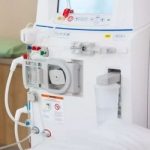 | Dialysis Technician Dialysis technicians maintain and monitor dialysis equipment, and also act as primary caregivers for patients undergoing dialysis treatment. |
 | Dog Groomer Dog groomers attend to grooming dogs, usually at dog salons or big pet-related chain stores. |
 | Healthcare Administrator Healthcare administrators – also known as healthcare executives or health services managers – are responsible for the planning, direction, and coordination of medical and health services. |
 | Home Health Aide Home health aides provide home care to individuals who require assistance in their day-to-day living. |
 | Licensed Practical Nurse (LPN) Licensed Practical Nurses provide basic nursing care to patients and work with Registered Nurses and Doctors. |
 | Medical Assistant Medical assistants support the work of physicians, nurses, and other health professionals. |
 | Medical Biller and Coder Medical billers and coders manage, organize, and code various health information data. |
 | Medical Technologist Medical laboratory technologists collect bodily samples and conduct tests to analyze those samples. |
 | Medical Transcriptionist Medical transcriptionists go over voice recordings to convert them into written texts. |
 | Nutritionist As a Nutritionist, you’ll be tasked with creating meal plans, counseling, and understanding dietary restrictions for all types of clients. |
 | Patient Access Representative The work involves helping people to orient themselves to the space and everything that is going on. |
 | Patient Care Technician Patient care techs work directly with patients helping them with daily activities and assist the medical staff by measuring and monitoring the patients' vital signs among other tasks. |
 | Pharmacy Technician Pharmacy technicians provide patients with medications through prescription or over the counter. |
 | Phlebotomist As a Phlebotomist, it will be your responsibility to take blood samples from patients and send them to the lab for further testing. |
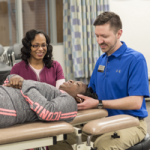 | Physical Therapist Assistant Physical therapist assistants provide physical therapy services to patients and aide to physical therapists. |
 | Professional Recovery Coach A professional recovery coach is a life coach who works with someone during their addiction recovery process. |
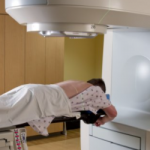 | Radiation Therapist Allied health provisional who specializes in radiation oncology treatments. |
 | Registered Health Information Technician Registered Health Information Technician (RHIT) help store and verify accuracy of health records as well as analyze patient data. |
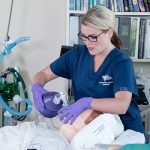 | Respiratory Therapist Respiratory therapists treat and care for patients who experience breathing difficulties. |
 | Sterile Processing Technician A sterile processing technician is a healthcare professional who is responsible for preparing, sterilizing, maintaining, packaging, and storing medical tools and equipment used in surgical and other medical procedures. |
 | Surgical Technologist Surgical technologists – also known as operating room techs – prepare operating rooms and assist doctors and nurses during surgical procedures. |
 | Vet Office Manager Veterinary office managers work to make sure that the daily operations run smoothly and efficiently at veterinary hospitals or veterinary clinics. |
 | Veterinary Assistant Veterinary Assistants work closely with Veterinarians to handle routine animal care. |
 | Veterinary Technician Veterinary Technicians assist veterinarians as well as diagnosing and treating animals, mostly in private clinics. |
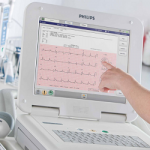 | EKG Technician EKG technicians test and monitor the cardiovascular system. |
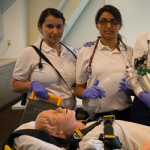 | EMT Trained emergency medical technician that arrives at the scene to provide medical services such as resuscitation. |
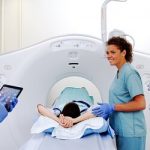 | MRI Technologist MRI Technologists use a machine to scan the body and create a detailed image of the inside for doctors to analyze. |
 | Optician Opticians are technicians and salespersons at the same time who spends most of their day talking to customers, reading prescriptions written by doctors, and dispensing glasses and lenses. |
 | Ultrasound Technician Ultrasound technicians aid physicians in monitoring and diagnosing patients through the use of ultrasonic imaging technology. |
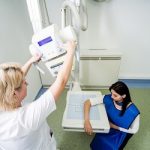 | X-Ray Technician X-Ray Technicians are medical imaging professionals who use technology to visualize the inside of our bodies. |














